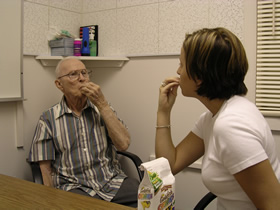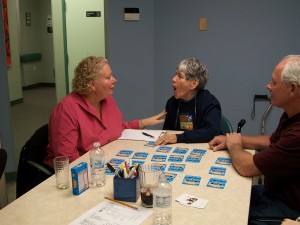Speech Therapy for Adults with Apraxia
Apraxia, sometimes called verbal apraxia or acquired apraxia of speech, is a motor speech disorder. This means that the problem arises from poor motor coordination. A person with apraxia has trouble with the muscle control that is needed to form words. Patients may develop acquired apraxia of speech regardless of how old they are, but it more commonly afflicts adults. As opposed to acquired apraxia, developmental apraxia is present in children from birth.
Causes of Apraxia
Acquired apraxia of speech is caused by brain damage. When a traumatic brain injury causes damage to the areas of the brain that controls movement, apraxia can result. Apraxia can also be caused by dementia, progressive neurological disorders, and brain tumors; however, the most common cause of apraxia in an adult is a stroke. Sometimes, a person who develops apraxia will also develop aphasia.
Common Signs of Apraxia
Much like aphasia, a person’s intelligence is not affected with the development of acquired apraxia. While the patient understands what he is trying to say, his brain cannot properly manipulate the structures (tongue, palate, etc) necessary for speech. The symptoms of apraxia can range from mild to severe. Family members will likely note that the patient becomes frustrated when he cannot speak the words properly. The patient may produce nonsense words, or words that sound similar, but have an entirely different meaning than the ones he wishes to speak. For example, he may say “mouse” instead of “house.”
People with apraxia tend to be able to produce common strings of words, or automatic speech, more easily than spontaneous speech. For example, they may be able to say “Good morning,” but if asked whether they wish to wear the blue shirt or the red, they may have trouble verbalizing their choices.
Those with severe apraxia may be unable to produce any sounds. Otherwise, the patient will typically display a slow rate of speech. Loved ones will likely notice that the patient appears to struggle or grope to produce words. When asked to repeat sounds that another person verbalizes, the patient with apraxia will likely have difficulty imitating them.
Treatment for Apraxia
The treatment for acquired apraxia of speech will vary depending on the severity of the symptoms and the patient’s individual needs. Those with mild cases of apraxia may benefit from speech therapy that is designed to improve the pronunciation of words. The speech therapist may instruct the patient to watch and listen to him speak a word, following which the patient is encouraged to repeat the word. Patients with moderate symptoms may require help learning the correct positioning of the lips, tongue, etc. in order to produce the correct sounds.
Patients with severe symptoms of apraxia may be able to communicate effectively with sign language or written language. Otherwise, they may be taught to use electronic communication aids. Some of these devices generate speech from inputted letters or symbols, while others generate written words on a screen.






I am wanting to find a speech therapist in the Fort Worth area to work with my adult son. He is adopted and has always had trouble speaking. We believe he has fetal alcohol effect. He has trouble finding and keeping jobs partly because of his speech and we know this is frustrating to him.
Thanks so much for any advice you can lend.
Carol J. Smith
HI Carol, try the list of Speech Buddy Providers in Texas to get you started with clinician’s around Texas http://www.speechbuddy.com/slps/provider-program I would also check out ASHA’s provider directory http://www.asha.org/proserv/. Good luck!
The causes,common signs and treatments of Apraxia, speech therapy for the adults are well explained. Knowing the root causes helps to solve the problem easily. Thanks for the information.